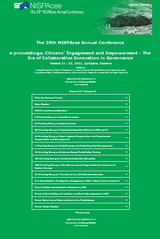EVENTS from Other Institutions
5th Central and Eastern European Forum for Young Legal, Political and Social Theorists
May 3, 2013 - May 4, 2013
Venue: Greifswald, Germany
Organizer(s): Department of Political and Communication Science, University of Greifswald
Language: English
Contact: Dr. Michael Hein
E-mail: michael.hein@uni-greifswald.de
Info link: http://www.cee-forum.org/2013
The CEE Forum is a platform for young legal, political and social theorists who come from, currently study or work in Central and Eastern Europe or have a research interest in the region. The regional boundaries are understood widely. The target audiences of the conference are young researchers, especially doctoral students and post-docs, without a specific age limit. As in the previous Forums, the conference will be organised in three concurrent panels and will put its special emphasis on two major general topics. 1) Separation of Powers & Constitutional Review. Two core elements of modern constitutional democracies: separation of powers and constitutional review will be discussed in the first panel. These ideas are of enduring timeliness in legal and political theory. The organisers especially welcome submissions to answer the following questions: Is the separation of powers still applicable to the complexity of modern polities or is it of mere historical importance? How is this principle realised in the governmental system of the European Union? What is the exact meaning of the term separation and its manifold synonyms and alternatives? What is the “nature” of constitutional review: Is it jurisdiction, politics in the cloak of the law, something in between or even something totally different? What are the borders of constitutional review? How does the relationship between separation of powers and constitutional review look like: What is (or should be) the place of constitutional review in a power-separating order? Is it a part or the top of the judiciary or an own branch? 2) Constitutional Rights & Obligations. The second panel is dedicated to constitutional rights and obligations. Most modern constitutions provide basic rights and freedoms for individuals and/or groups in order to protect them against encroachments by the state. Additionally, there is some general consent in constitutional theory, which fundamental rights a constitution should at least guarantee. In contrast, obligations are much rarer in the constitutional landscape. Even basic necessities like tax paying are often not elevated to constitutional status. The following questions will be discussed: Should constitutions incorporate obligations or do obligations systematically violate the basic principles of liberal and democratic policies? How are constitutional obligations related to constitutional rights – both normatively and empirically? In particular, how do obligations influence liberty rights? Finally, which perspective do concurrent theories of democracy take on constitutional obligations, for instance on the idea of compulsory voting? 3) Open Panel. In order to meet the diverse interests of the Forum’s participants from different disciplines, the third panel will be open to all interesting topics from the vast area of legal, political and social theory.




 Price:
Price: 









